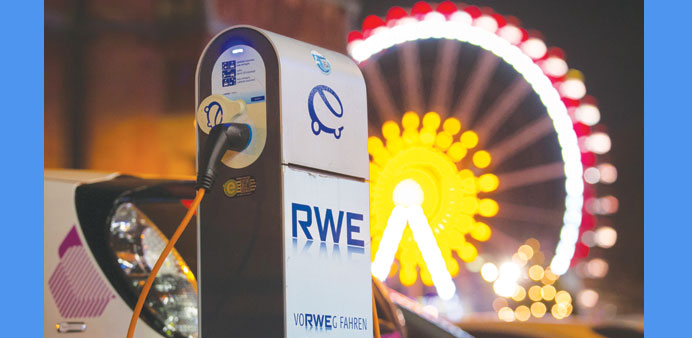The RWE logo sits on the side of an electric automobile charging station as a ferris wheel stands illuminated behind in Berlin. An infusion of fresh capital would also bolster Essen-based RWE, which this month forecast difficult years ahead amid Germany’s expansion of wind and solar energy.
Bloomberg/London
RWE is considering selling a 10% stake to Abu Dhabi investors as Germany’s second-largest utility contends with sliding prices and surging debt, according to people with knowledge of the matter.
RWE has been in talks with investors in the emirate about the potential sale since last year and there is no certainty an agreement will be reached, the people said, asking not to be named as the details aren’t public.
RWE was contacted by an investor from the Middle East region a few months ago, spokeswoman Sabine Jeschke said by phone. The company is considering different types of cooperation, she added, declining to comment further.
Abu Dhabi’s Sheikh Mansour bin Zayed al-Nahyan is among investors who may participate in the investment, which would be valued at about €1.5bn ($1.6bn) based on RWE’s market price, the people said.
The German utility closed up 3.7% at €24.54 in Frankfurt, the biggest increase in more than three weeks, valuing the whole company at about €15bn. About 2.3 times the daily three-month average was traded, and the stock was the biggest gainer both in the STOXX 600 Utilities Index and Germany’s benchmark DAX index.
RWE could announce the sale in conjunction with a strategic partnership in the Middle East, one of the people said. The company is looking for one more region to go to which may be the Gulf region, chief executive officer Peter Terium told analysts last week on a call.
An infusion of fresh capital would also bolster Essen-based RWE, which this month forecast difficult years ahead amid Germany’s expansion of wind and solar energy. RWE management only needs approval from its supervisory board to increase the company’s capital by as much as 20%, after shareholders voted at last year’s annual general meeting to allow any such deal through April 2019.
Contact information for Sheikh Mansour couldn’t be located and a representative for his foundation didn’t immediately respond to requests for comment via e-mail and telephone.
Domestic rival EON in November announced plans to break itself up, the most radical response yet to Germany’s unprecedented switch to renewable energy, and a strategy that RWE also hasn’t ruled out.
In January, power for next-year delivery fell to the lowest since April 2004, eroding the profitability of traditional utilities that run coal, gas and nuclear generation plants.
Several German companies have sold stakes to investors in the Middle East in recent years as they seek to shore up capital reserves. Deutsche Bank raised €1.75bn last year selling stock to a Qatari investment vehicle as part of its €8bn capital increase.
And in March 2009 Aabar Investments bought a 9% stake in Daimler after financial markets collapsed. The Abu Dhabi investor sold its remaining voting stake in the Stuttgart, Germany-based manufacturer in October 2012.
Siemens, listed real-estate company Deutsche Annington Immobilien and construction firm Hochtief also count investors from the Middle East among their largest shareholders, according to data compiled by Bloomberg.

